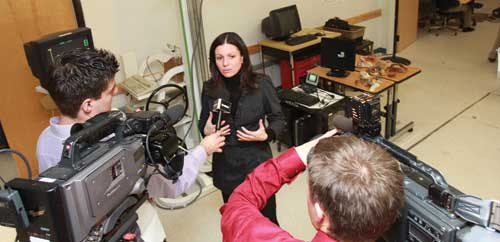Dr. Claudia Gonzalez (kinesiology and physical education) is interested in how the brain connects vision and motor skills, such as hand movements.
Dr. René Boeré (chemistry and biochemistry) and his colleagues examine the finest details of molecules, among other projects.
The two very different research teams recently received a significant amount of money from the Canada Foundation for Innovation Leaders Opportunity Fund; with matching support from the Small Equipment grant programs from the government of Alberta. Overall, the researchers will receive $547,778 and additional support from the University of Lethbridge and industry partners brings that total to more than $700,000.

Boeré led a group application to fund specialized imaging equipment that will be used to examine the fine details of nanomaterials ($352,008). Gonzalez will receive funding to obtain equipment that she will use to monitor, in greater detail, how the brain processes motor skill signals that control such activities as hand and eye movement ($195,770).
University of Lethbridge President Mike Mahon says that investment from the federal and provincial governments, working in partnership, are critical in ensuring that researchers have the tools they need to answer the important questions facing communities in Alberta, Canada and beyond.

"It cannot be understated how important a strong research program is to the health of an institution that serves undergraduate and graduate students," says Mahon. "Our student-first approach is strengthened because our students are able to interact with talented, supported researchers like Dr. Gonzalez,
Dr. Boeré and their colleagues."
Mahon adds that research investments are also critical in ensuring that Alberta and Canada are able to recruit and retain talented faculty and students from across the globe.
"The U of L is in a fortunate position. Researchers, graduate and undergraduate students from jurisdictions where funding to post-secondary sector have been drastically cut are surveying the landscape," he says. "When they see the governments of Canada and Alberta investing in a knowledge economy – as they are today – they are compelled to consider if their research program or educational experience is better suited at a comprehensive university like the
U of L."
For Boeré and his research team, the new equipment will dramatically increase their productivity simply because they will no longer have to drive to Calgary to borrow similar research tools.
Gonzalez's projects rely on the accurate measurement of fine motor co-ordination, primarily in a person's hands while reaching for an object. While her current measurement process can pinpoint the motion in a finger joint, for example, her additional equipment will also be able to show which side of the brain is working when that motion or movement is engaged. This will help to determine how dominant the right or left side of the brain is for certain functions.
For a look at the February issue of the Legend in a flipbook format, follow this link.
